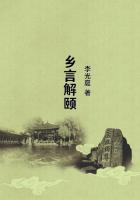Perhaps it is now one in the afternoon; and at the same instant of time, a ball rises to the summit of Nelson's flagstaff close at hand, and, far away, a puff of smoke followed by a report bursts from the half-moon battery at the Castle. This is the time-gun by which people set their watches, as far as the sea coast or in hill farms upon the Pentlands. - To complete the view, the eye enfilades Princes Street, black with traffic, and has a broad look over the valley between the Old Town and the New: here, full of railway trains and stepped over by the high North Bridge upon its many columns, and there, green with trees and gardens.
On the north, the Calton Hill is neither so abrupt in itself nor has it so exceptional an outlook; and yet even here it commands a striking prospect. A gully separates it from the New Town. This is Greenside, where witches were burned and tournaments held in former days.
Down that almost precipitous bank, Bothwell launched his horse, and so first, as they say, attracted the bright eyes of Mary. It is now tesselated with sheets and blankets out to dry, and the sound of people beating carpets is rarely absent. Beyond all this, the suburbs run out to Leith; Leith camps on the seaside with her forest of masts; Leith roads are full of ships at anchor; the sun picks out the white pharos upon Inchkeith Island; the Firth extends on either hand from the Ferry to the May; the towns of Fifeshire sit, each in its bank of blowing smoke, along the opposite coast; and the hills enclose the view, except to the farthest east, where the haze of the horizon rests upon the open sea. There lies the road to Norway: a dear road for Sir Patrick Spens and his Scots Lords; and yonder smoke on the hither side of Largo Law is Aberdour, from whence they sailed to seek a queen for Scotland.
'O lang, lang, may the ladies sit, Wi' their fans into their hand, Or ere they see Sir Patrick Spens Come sailing to the land!'
The sight of the sea, even from a city, will bring thoughts of storm and sea disaster. The sailors' wives of Leith and the fisherwomen of Cockenzie, not sitting languorously with fans, but crowding to the tail of the harbour with a shawl about their ears, may still look vainly for brave Scotsmen who will return no more, or boats that have gone on their last fishing. Since Sir Patrick sailed from Aberdour, what a multitude have gone down in the North Sea! Yonder is Auldhame, where the London smack went ashore and wreckers cut the rings from ladies' fingers; and a few miles round Fife Ness is the fatal Inchcape, now a star of guidance; and the lee shore to the east of the Inchcape, is that Forfarshire coast where Mucklebackit sorrowed for his son.
These are the main features of the scene roughly sketched. How they are all tilted by the inclination of the ground, how each stands out in delicate relief against the rest, what manifold detail, and play of sun and shadow, animate and accentuate the picture, is a matter for a person on the spot, and turning swiftly on his heels, to grasp and bind together in one comprehensive look. It is the character of such a prospect, to be full of change and of things moving. The multiplicity embarrasses the eye; and the mind, among so much, suffers itself to grow absorbed with single points.
You remark a tree in a hedgerow, or follow a cart along a country road. You turn to the city, and see children, dwarfed by distance into pigmies, at play about suburban doorsteps; you have a glimpse upon a thoroughfare where people are densely moving; you note ridge after ridge of chimney-stacks running downhill one behind another, and church spires rising bravely from the sea of roofs. At one of the innumerable windows, you watch a figure moving; on one of the multitude of roofs, you watch clambering chimney-sweeps. The wind takes a run and scatters the smoke; bells are heard, far and near, faint and loud, to tell the hour; or perhaps a bird goes dipping evenly over the housetops, like a gull across the waves. And here you are in the meantime, on this pastoral hillside, among nibbling sheep and looked upon by monumental buildings.
Return thither on some clear, dark, moonless night, with a ring of frost in the air, and only a star or two set sparsedly in the vault of heaven; and you will find a sight as stimulating as the hoariest summit of the Alps.
The solitude seems perfect; the patient astronomer, flat on his back under the Observatory dome and spying heaven's secrets, is your only neighbour; and yet from all round you there come up the dull hum of the city, the tramp of countless people marching out of time, the rattle of carriages and the continuous keen jingle of the tramway bells. An hour or so before, the gas was turned on; lamplighters scoured the city; in every house, from kitchen to attic, the windows kindled and gleamed forth into the dusk. And so now, although the town lies blue and darkling on her hills, innumerable spots of the bright element shine far and near along the pavements and upon the high facades. Moving lights of the railway pass and repass below the stationary lights upon the bridge.
Lights burn in the jail. Lights burn high up in the tall LANDS and on the Castle turrets, they burn low down in Greenside or along the Park. They run out one beyond the other into the dark country. They walk in a procession down to Leith, and shine singly far along Leith Pier.
Thus, the plan of the city and her suburbs is mapped out upon the ground of blackness, as when a child pricks a drawing full of pinholes and exposes it before a candle; not the darkest night of winter can conceal her high station and fanciful design; every evening in the year she proceeds to illuminate herself in honour of her own beauty; and as if to complete the scheme - or rather as if some prodigal Pharaoh were beginning to extend to the adjacent sea and country - half-way over to Fife, there is an outpost of light upon Inchkeith, and far to seaward, yet another on the May.
And while you are looking, across upon the Castle Hill, the drums and bugles begin to recall the scattered garrison; the air thrills with the sound; the bugles sing aloud; and the last rising flourish mounts and melts into the darkness like a star: a martial swan-song, fitly rounding in the labours of the day.














